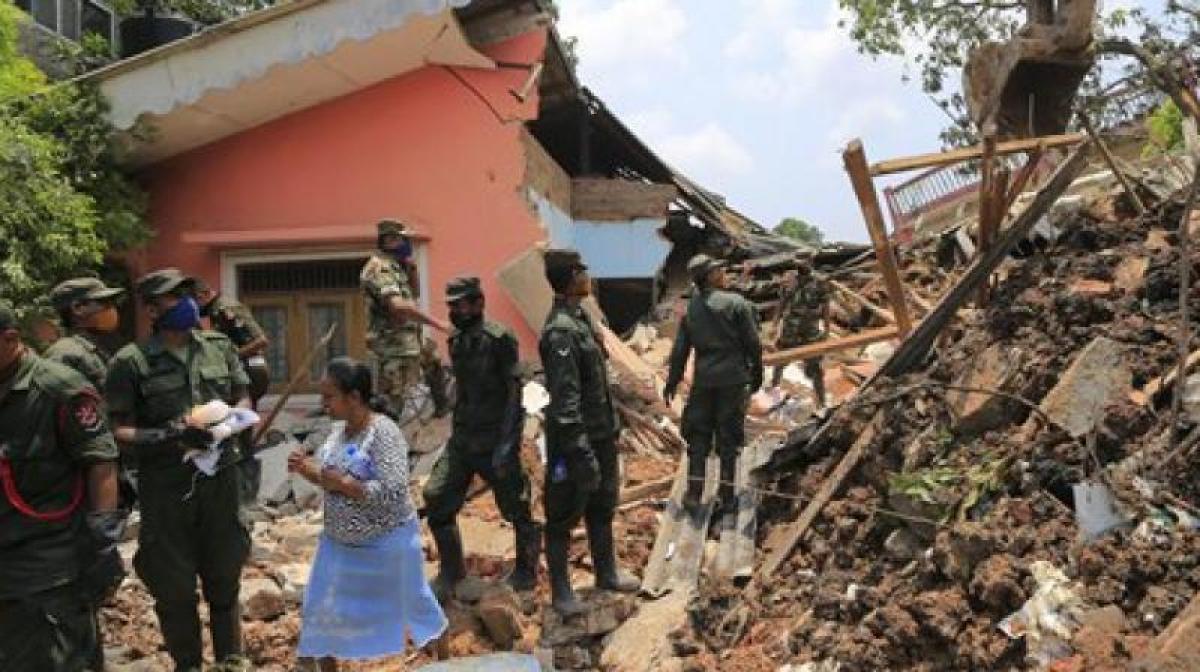Live
- HMPV Outbreaks Spark Global Health Concerns: What You Need to Know
- Gautam Gambhir Faces Criticism Over Tactical Errors in Australia Tour
- CM Revanth Reddy Announces Surprise District Tours Starting January 26
- Telangana's TOMCOM Invites Applications for Driver Jobs in Germany
- Calcutta HC rejects plea by rights body for stall allotment at Kolkata Book Fair
- Bengaluru Beer Prices to Rise by Up to 20% Starting January 20
- My Fans Are Like Disciplined Soldiers: Nandamuri Balakrishna
- Adani Group raises Rs 4,850 crore after selling 13.5 pc stake in Adani Wilmar
- "Jogulamba Gadwal Health Officials Assure Public: No Panic Over HMPV Virus".
- "Charity and Annadanam Program Held on BOSS Hanumanthu Naidu’s Birthday".
Just In

The death toll in the giant open garbage dump which collapsed and buried dozens of houses near the Sri Lankan capital has climbed to 30 after rescuers pulled out more bodies from the rubble on Monday.
The death toll in the giant open garbage dump which collapsed and buried dozens of houses near the Sri Lankan capital has climbed to 30 after rescuers pulled out more bodies from the rubble on Monday.
At least seven children were among 30 people killed in the collapse of the garbage dump in Meetotamulla area in Kolonnawa near Colombo, local media quoted officials as saying.
According to the Disaster Management Centre, at least 625 people belonging to 180 families had been displaced due to the tragedy, the report said.
Survivors of the garbage dump site blamed politicians for the tragedy. "I lost my three children. My wife is in a critical condition. My battle has ended," said N Keerthiratne, who as the Convenor of the movement 'People Against the Meethotamulla Dump' has led many protest since 2009 when the dumping of heaps of Colombo garbage began at the site.
"Please do not report this as a natural tragedy, please say this was a planned massacre, relatives of the victims cry hoarse," he said.
"Is this my fate? Now I only have to live for my grandson," Keerthiratne, a retired prison official sobbed looking at the rubble that is left of his two storied house.
The military said 1,000 security personnel, including police and special task forces, have been deployed for rescue operation. It said troops from the Sri Lanka Light Infantry, Commandos, Gemunu Watch and Vijayabahu Infantry Regiment were carrying out relief operations, the Colombo Gazette reported.
The National Building Research Organisation said the site of the accident be declared a "danger zone" and people living in over 130 houses in the area must be relocated for safety.
Officials said hundreds of people have been moved to temporarily shelters and the government will soon begin shifting more people.
Since, the residents of the north Colombo Bloemendhal ward were protesting against the dump site there, the Supreme Court ordered that it should be relocated at Meethotamulla, limited to two acres.
"What was limited to be just two acres continued to expand. Two acres have now become 18 acres. We protested but were beaten up by the police using tear gas," Stanley Silva, a resident said.
"In 2011, several houses began to crack open because of the dump. We protested in January, August 2012 and throughout 2013. We represented the matter to the former Rajapaksa government and the current government. Prime Minister promised to give a solution within 6 months. But nothing happened," Nuwan Bopage, a lawyer who had led the protests, said.
Nearly 80 houses completely destroyed while 17 more have suffered partial damage, officials said. Schools and others facilities will be moved as well, Deputy Minister of Foreign Affairs Harsha De Silva said.
He said the dumping of garbage at the site has been banned. Ironically, the government had signed agreements a few weeks ago to convert the waste into energy, he said in a post on Facebook.
Police were investigating whether the collapse of the 91-metre open garbage pile could be a sabotage. A 10-member team of geologists, officials from mining and excavation divisions, have been sent to the spot.
More than 600 people had to flee in the aftermath of the mishap on Friday. Prime Minister Ranil Wickremesinghe in a statement has apologised for the delay in relocating the garbage dump.
The residents near the dump had been protesting for months, demanding that the garbage dump be relocated. The authorities, however, claim that they had given enough warning to the slum dwellers to relocate themselves.
"We had even paid compensation to them to relocate," De Silva said. He said the state will bear the funeral expenses of the dead.
The massive garbage caught fire and collapsed on dozens of homes as the residents celebrated the traditional New Year. Police said the true scale of the damage remained unclear.
Sri Lanka's Parliament was recently warned that 23 million tonnes of garbage at Kolonnawa dump was a serious hazard. About 800 tonnes of garbage were added to the dump daily.

© 2025 Hyderabad Media House Limited/The Hans India. All rights reserved. Powered by hocalwire.com







